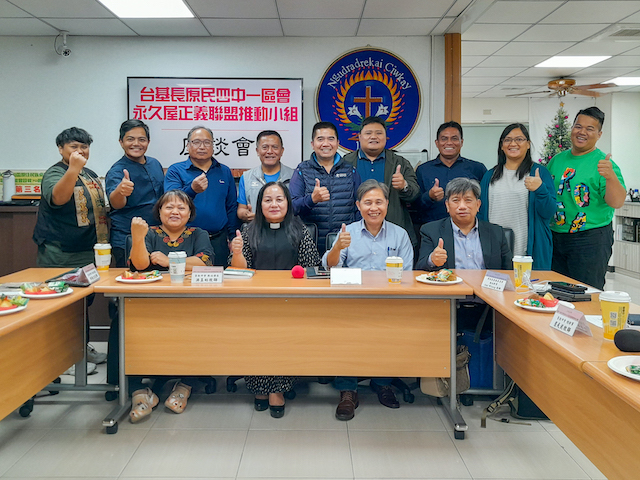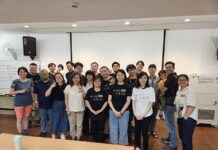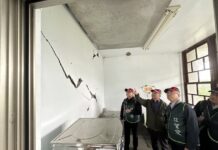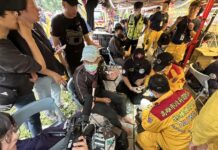Taiwan Church News
3712 Edition
April 17 ~ 23, 2023
Headline News
Indigenous PCT Presbyteries Advocate Permanent Housing Project
Report by Lin Wan-ting from Pingtung
Translated by Peter Wolfe
It is 14 years passed and still has an enormous social impact after the Typhoon Morakot devastated at southern parts of Taiwan in 2009. Since then, local people and aborigines who were forced to evacuate from their hometowns and moved into the “permanent housing” communities built by charity organizations. However, disputes related to land ownership and residential rights have continued to arouse debates and discussions in these years.
As the issue of permanent housing is closely related to the church’s teachings and stance of social care, on April 10th, Ngudradrekai (Rukai) Presbytery, Payuan Presbytery, Nanbu Presbytery, the Kacedas Payuan (Eastern Payuan) Presbytery and Cou District Assembly launched the “The PCT Alliance for Aboriginal Permanent Housing Rights” to speak out and advocate the residential rights for the aboriginal communities.
After many rounds of meeting, four presbyteries and one district assembly decided the name of the alliance as “The PCT Alliance for Aboriginal Permanent Housing Rights” at the meeting on April 10th, and will hold another meeting on May 1 to draw up the organization charter.
At the April 10 meeting, Rev Peresang Palikiliki, minister of Church and Society Committee of Ngudradrekai Presbytery, and Rev Lrwane Davelengan, moderator of Ngudradrekai Presbytery, jointly briefed the participants on the key points the issue of permanent housing.
To avoid the consensus, reached by The PCT Alliance for Aboriginal Permanent Housing Rights at each meeting, to be scraped, changed or re-started all over again due to a change of representatives, i.e. a periodical election of moderator, general secretary, and secretary of Church and Society Committee in each presbytery and district assembly, it is hoped that the PCT Indigenous Mission Committee will take part in the meeting. In the future, the representatives of the alliance will also be elected mainly from the presbytery and ethnic district assembly.
Rev Omi Wilang, secretary of the PCT Indigenous Mission Committee, is invited to attend the meeting and shared his thoughts about the issue of aboriginal reserve and housing justice. He pointed out that general land use and construction project at the national level usually launches a comprehensive review about every five years, but there is no such proceeding for permanent housing.
He believes that permanent housing project is established via combining the resources of the government and welfare charity groups. So it is unreasonable to have no legal procedures for problem discussion and solution, especially for the most common need for “house expansion” after the increase of family members. At present, there is no law on permanent housing to refer to or follow up.
As the “Special Acts on the Post-Morakot-Typhoon Reconstruction Project” has been abolished, at this stage only the tripartite contract can be referred to. But Omi Wilang pointed out straight forwardly that the tripartite contract is only a temporary act, so this is “government nonfeasance” in disguise.
Omi Wilang asks the audience to think some related problems of permanent housing: Is the management of permanent housing project run by local government or central government? What is the core elements of housing safety, quality and development? How to clarify the legal basis between the disaster area reconstruction and the rights of aboriginal reserve land? How could the Presbyterian Church in Taiwan get involved in these issues? Is there a channel to express the aboriginal stance in the Legislative Yuan and local government? In order to urge the government to attend the aboriginal demands and take action, Rev Omi Wilang emphasized that on the issue of permanent housing, multi-party cooperation is needed to speak out loud.
Rev Palri Aruladenge, general secretary of Ngudradrekai Presbytery agreed with Rev Omi Wilang’s point of view. He pointed out that the indigenous’ understanding of the reserve land should be interpreted and understood by their own ethnic group. During the Q&A time, Rev Tahai Palalavi, representative of Nanpu Presbytery and pastor of Nansalu Church, asked whether it is possible to directly pull this urgent issue of permanent housing up to the PCT General Assembly, so as to avoid the tedious documents’ back and forth between the presbytery/district assembly.
But Rev Lrwane Davelengan believes that both the PCT General Assembly and the Alliance should work together, because a continuous “bottom-up” promotion is needed. Through a real idea-exchange and communication, the PCT General Assembly can better understand the real situation of the permanent housing. He also appeals to the audience to share the contents of the meeting and bring it back to their respective presbytery/district assembly for further discussion.
Rev Aravas Talalang, representative of Payuan Presbytery and pastor of Tjavadran Church, reminded the congregation to think more carefully about the representative voice of the PCT and pay attention to the effectiveness of cross-denominational cooperation. Rev Loyo Teru, representative of Kacedas Payuan Presbytery and pastor of Qaljapitj Church said in a straight manner that the permanent housing community needs to rebuild, the inheritance issue needs to be solved, and the establishment of the Alliance is very important and absolutely necessary.







